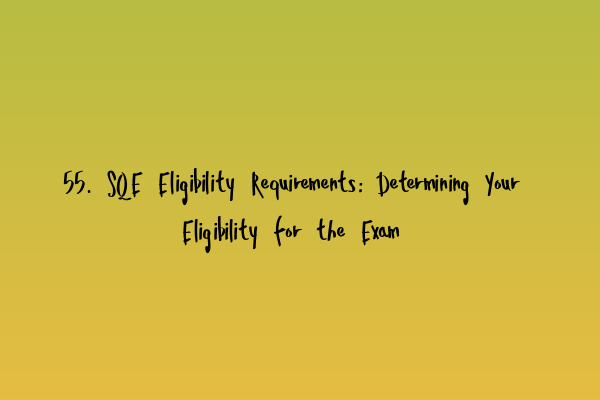SQE Eligibility Requirements: Determining Your Eligibility for the Exam
Are you considering taking the Solicitors Qualifying Examination (SQE)? If so, it is important to understand the eligibility requirements before you begin your preparation. The SQE is a rigorous exam that tests the knowledge and skills necessary to become a solicitor in England and Wales. In this blog post, we will explore the eligibility criteria for the SQE and provide you with a clear understanding of what is required to sit for the exam.
1. Academic Qualifications
The first step in determining your eligibility for the SQE is to assess your academic qualifications. According to the Solicitors Regulation Authority (SRA), the body responsible for regulating solicitors in England and Wales, you must have a degree (or equivalent) in any subject in order to be eligible for the exam. This means that you do not necessarily need a law degree to sit for the SQE, making it accessible to individuals from diverse educational backgrounds.
However, it is important to note that if your degree is not from a recognized institution, you may need to obtain a Certificate of Academic Standing from the SRA before you can sit for the SQE. This certificate serves as proof that your academic qualifications are equivalent to a UK degree.
Once you have confirmed that you meet the academic requirements, you can move on to the next step of determining your eligibility for the SQE.
2. Character and Suitability
In addition to academic qualifications, the SRA also considers the character and suitability of individuals who wish to become solicitors. This assessment ensures that individuals entering the profession uphold the highest standards of integrity and ethical conduct.
As part of the SQE eligibility requirements, you will be required to provide information about any criminal convictions, bankruptcy declarations, or regulatory findings that may impact your suitability for the legal profession. It is important to be honest and transparent in your disclosure, as any false or misleading information could have serious consequences for your eligibility.
If you have any concerns about your character and suitability, it is advisable to seek legal advice or guidance from a professional body such as the SRA.
3. English Language Proficiency
Since the practice of law in England and Wales is conducted in English, it is essential that candidates for the SQE possess a good command of the language. Therefore, individuals whose first language is not English may be required to provide evidence of their English language proficiency.
The SRA accepts the International English Language Testing System (IELTS) as proof of English language proficiency. The minimum IELTS score required for the SQE may vary, so it is important to check the latest requirements from the SRA to ensure that you meet the criteria.
4. Additional Requirements
In addition to the above eligibility criteria, there may be additional requirements depending on your individual circumstances. For example, if you have previously completed the Legal Practice Course (LPC) or the Qualified Lawyers Transfer Scheme (QLTS), you may be exempt from certain parts of the SQE.
Moreover, if you have any disabilities or special requirements that may affect your ability to take the exam, you should inform the SRA in advance. They will make necessary accommodations to ensure that you have a fair and equal opportunity to demonstrate your knowledge and skills.
For a comprehensive overview of the SQE eligibility requirements, it is advisable to refer to the SRA’s official website or consult with a professional legal education provider.
Conclusion
The SQE is a challenging exam that requires thorough preparation and a deep understanding of the eligibility requirements. By assessing your academic qualifications, character and suitability, English language proficiency, and considering any additional requirements, you can determine your eligibility for the exam and take the necessary steps to fulfill your goal of becoming a solicitor in England and Wales.
Remember, preparation is key to success in the SQE. If you need assistance with exam preparation, you may find our related articles helpful:
